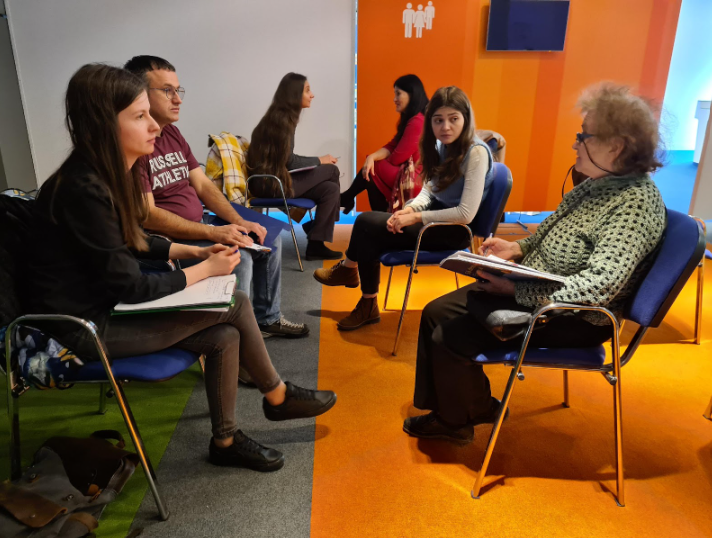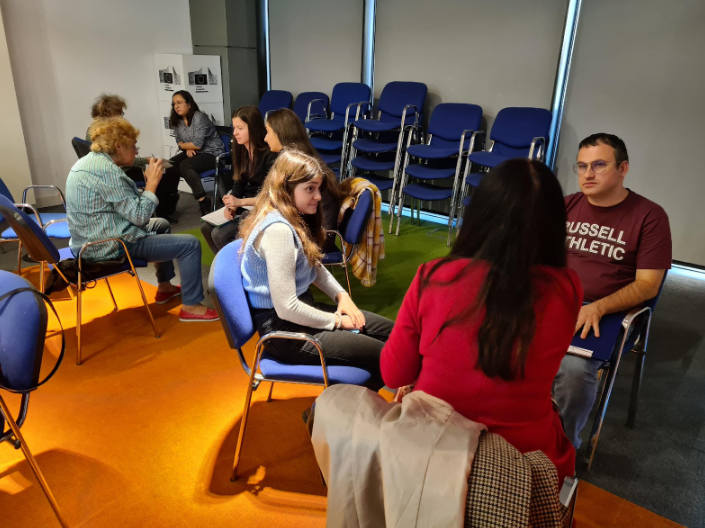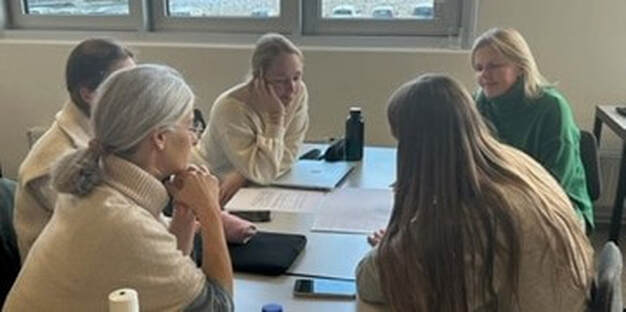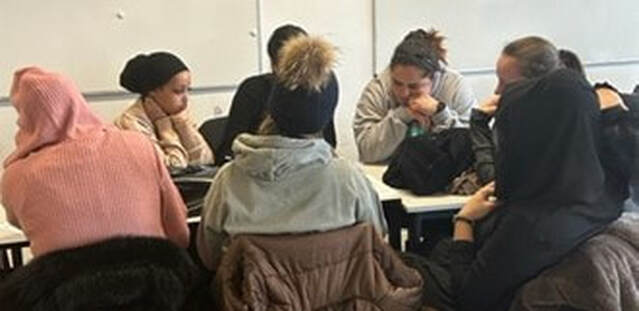|
On January 21, 2023, ACEEU designed an intergenerational activity as part of the PAGES project awareness campaign activity aimed at creating meaningful interactions between different generations and age groups. For this purpose, it was essential to gather in a space which feels safe and comfortable for each of the age groups who would be joining the activity. ACEEU designed the afternoon in collaboration with the Next Door project, an EU-funded project that aims at promoting social capital within neighbourhoods, fostering the protection of elderly citizens and increasing their levels of self-esteem and quality of life, in a café in the city centre of Münster, Germany, for a story-telling session. The merging of the two events was seen as a strategy to build synergy as both projects, PAGES and Next Door have similar objectives. We extended the invitation to diverse target groups two weeks prior to the event to several student study groups, creative clubs, and senior homes and a total of 14 participants attended the event. There were Bachelors’ and Masters’ students in their 20s, and some professionals working in educational, social and medical sectors in their 30s, 30s and 40s. The idea of the social intergenerational afternoon was to encourage everyone to share stories from their own lives and communities of good practices in age-friendly neighbourhoods. The initial discussions brought participants closer together as they began to identify their shared common values and an understanding of the need to have more age-friendly societies. The discussions were enriched by the group of people which included care workers in a nursing home and a doctor from the field of palliative care who raised concerns from their own experiences working with the elderly and common perceptions surrounding ageism in society and how it can go unnoticed and ignored unless all generations actively work together towards a future where there is increased awareness of the form's ageism takes. To end the activity, the participants from the different generations shared more personal stories from their childhood of myths and cultural narratives surrounding how the elderly are treated. This exercise was intended to bring about a deeper sense of interest and acknowledgement of the place that members of different generations have in society and raise awareness of the shared experience of losing contact with the older generation as one grows up. Participants shared their feedback at the end through admiration for ACEEU’s efforts in bringing together different generations of people who might not have had the opportunity to meet otherwise and they reiterated the need to have more such activities in the future.
0 Comments
On 17th of October 2022, EASI organized an event meant to bring different generations and age groups together, part of the PAGES Awareness Campaign on age discrimination. The venue was selected to be accessible to all participants and snacks and drinks were provided. The structure of the event was inspired by the concept of Human Library and was adapted to match a smaller number of participants. This activity model was chosen because of its proven effectiveness on overcoming communication barriers, internalised prejudices, in sharing life stories and practicing active listening. Participants took turns to team up with older people to listen to their life stories. Seniors would play the role of "human books", while the other participants in conversation with them were "readers". Discussion was opened by a brief talk about the PAGES project, followed by a round of introductions and a walkthrough through the main rules and guidelines of the event. An open discussion about ageism was also encouraged, before splitting into smaller groups to allow for more personal conversations.
A total number of 8 participants joined the event, with ages ranging from 27 to 78, retired, teachers, working in social assistance, with older adults or in NGOs. Participants were mostly less aware about age discrimination among younger people, as it is more associated with older adults. Older participants to the activity had a considerably active life, as they are looking to visit their local senior day centre almost daily. They felt comfortable with sharing stories about their life, from where they were younger but also more recent. Our partner from Denmark, SOSU, began their intergenerational activity within the first project result. We invite you read below about their experience. We conducted 4 workshops with a total of 23 participants in the age range 18-62 years. The workshops were based on dialog and mindmaps created by each group, and the overall topic were ageism, and the experience of this topic in their everyday life including worklife. Both younger and older participants had heard of ageism, but didn’t think much of it in their daily life. They all agreed that the topic should be a bigger part of education, daily discussions and communication in society, and that we have to be more aware of the topic in order to change things in society. They also stated that in Denmark, when we talk about ageism, the focus is on the older generation, despite the fact, that the young participants have also experienced it in their daily life. All participants agreed that we can learn a lot from each other, if we have different ages and cultural backgrounds. The older generation has lifelong learning and skills they can share with the younger generation to widen the perspective, whereas the younger generation are very skilled digitally and might also have some new innovative thoughts on the workplace, routines, society etc. Also, when talking about activities, it is important to have a focus on the different learning competences for example that the activities must be facilitated at a speed all generations can embrace, so it is not too fast or too slow. The focus must be on the specific activity, rather than on the age- and cultural differentials.
Older and younger participants stated, that ageism was a matter for all regardless of age – they had all experienced it in different way. They all stated that they are positive in participating in activities across age, gender and culture. |
AuthorPages ArchivesCategories |








 RSS Feed
RSS Feed
